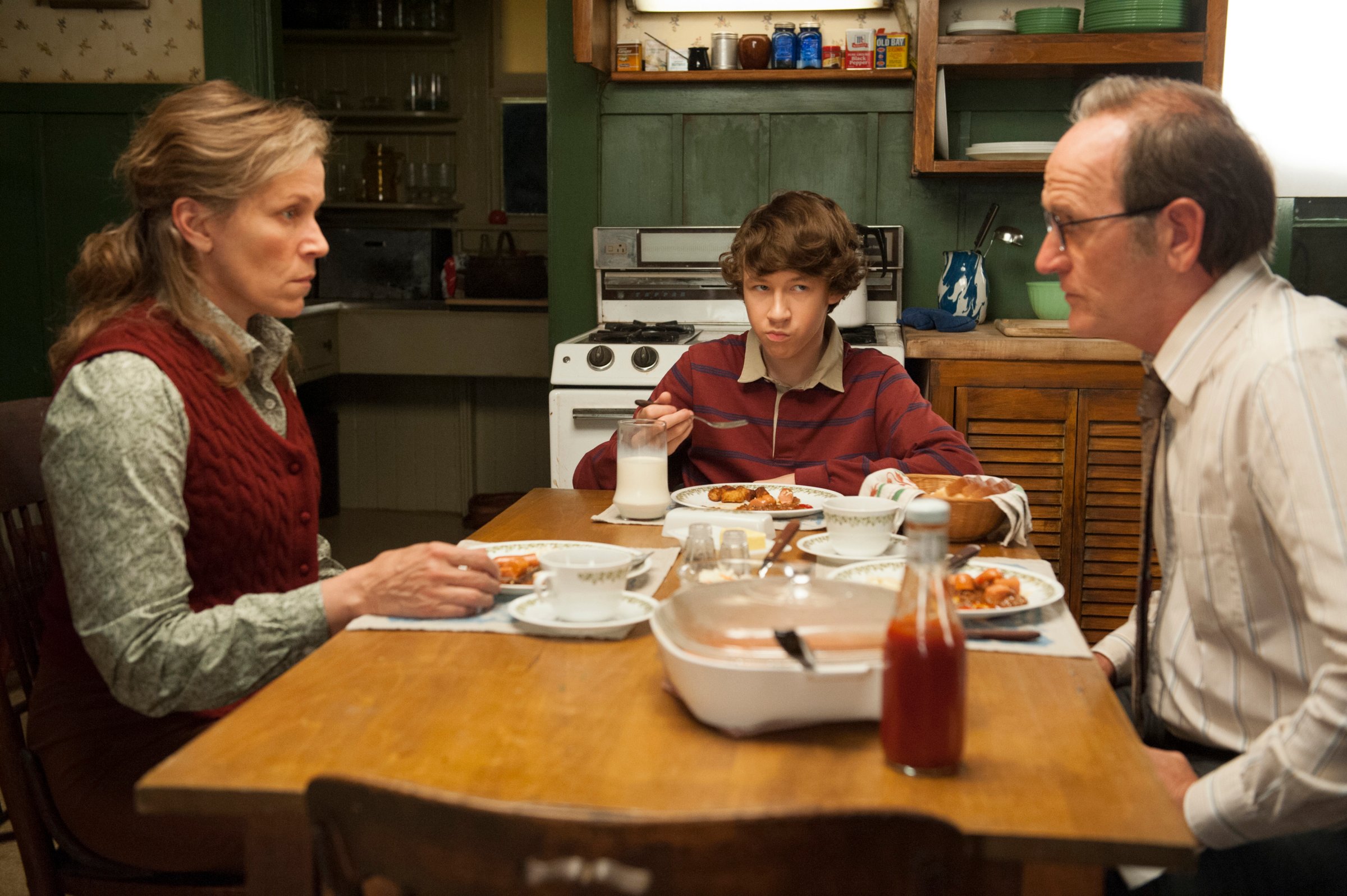
“She’s not the warmest person in the world.”
If I had a magic dictionary and could permanently strike any word from the vocabulary of culture and criticism, it would be “likable.” Particularly in TV, which asks us to spend hours in the company of characters, it follows us everywhere, from reviews and their comments sections to network pitches for their new shows. Like the character, goes the assumption, and you’ll like the show.
In HBO’s miniseries Olive Kitteridge (Nov. 2 and 3), the bristly title character never expresses an opinion of the term. But I’d like to think she would say it’s for saps. It is a stupid word. It’s near-meaningless, for one thing. Does it mean a character you would like in real life, a character you would not associate with but like watching, a character who is, in one way or another, like you? It’s slippery, squishy, empty, and yet has accrued great influence.
(The word even looks awful. “Likable,” Merriam-Webster’s preferred spelling, seems like it should be pronounced “lickable,” which is of course another criterion of value altogether.)
Too often, the drive for likability produces ingratiating, inoffensive characters who are unproblematic but also uninteresting. (Olive might call them “mice.”) But more than that, it’s an insult to viewers. It assumes they’re too simple, egocentric, narrow-minded to be involved in the stories of people whose personalities they don’t favor or whose goals they don’t approve of. It assumes they don’t want to deal with the dissonance of being unsettled, yet fascinated, by the behavior of fictional characters.
It assumes, in other words, that they don’t want to be challenged. In a way, that’s what likability is really code for: a likable character does not challenge the audience by asking them to identify with a person or a way of living that they do not personally approve of.
In recent years, we’ve moved beyond that bind to an extent in dramas about antiheroes–but it’s no coincidence that antiheroines are fewer and farther between, and their creators and their shows tend to take more guff about it. Because unlikability is about challenging, it bangs up against social expectations that women should not challenge us–that they should be pleasers and peacemakers, that we should be comfortable with them in a way we don’t necessarily expect with men.
Olive Kitteridge, on the other hand, is about as comfortable as a rocky New England beach in November. She’s impatient, tactless, practical, the kind of person who doesn’t see the point in pleasant social getures or keeping a greeting card after you’ve already read it. She’s not unloving–in fact, she feels intensely and deeply, and her behavior seems to be a kind of outgrowth of that. It takes work, as a viewer, to see the kindness in telling a widow wondering why her husband’s last words weren’t about her, “If you need proof you are loved, then you are in for one big fat disappointment,” but it’s there. To Olive, the best thing you can do for a person is help them see the world as it is.
What’s fascinating about, Olive is that she’s not simply “unlikable” in the way that a lot of cable-TV antiheroes and -heroines are. Unlikability–or, more accurately, a certain coldness, harshness, not being easy to get along with–is one of the central circumstances defining of her life. On one hand, she sees it as a point of pride, a mark of character and honesty, not to be like the simpering saps who exchange meaningless pleasantries to grease the wheels of social interaction. In life as in her math class, a C means average, and she’s not about to be party to interpersonal grade inflation. On the other, she often feels the distance it puts between her and those around her, and what it has cost.
Lisa Cholodenko’s film and Frances McDormand’s performance do not invite us to cheer Olive or to hate her. (I can’t speak for the Elizabeth Strout novel, which I haven’t read.) Her honesty can be refreshing–who hasn’t wanted to call a bratty kid a brat?–but it can also be harsh. It would have been easy to make her an endearingly crusty truth-teller, but that would just be the opposite way of giving in to the likability trap–by deciding that the only way to resolve the tension of a character like her is giving us permission to be wholeheartedly Team Olive. (The next term I’d get rid of, with my magic dictionary, would be “Team” Anything.)
In the end, Olive Kitteridge is a moving, draining, cathartic four-hour experience. It is emotionally intense, which can be tough to take but is the opposite of the likability approach to storytelling. “Likable” is the opposite of intense. It’s easy, inoffensive and eventually forgettable.
“Like” is a greeting card. It’s a tenth of a second clicking a button on Facebook. If the word ever meant anything worthwhile, we have well and truly killed it. Olive Kitteridge the character may not be likable in the commonly used sense, but Olive Kitteridge the miniseries goes after something much more unsettling, arduous and in the end worthwhile: love.
More Must-Reads From TIME
- The 100 Most Influential People of 2024
- The Revolution of Yulia Navalnaya
- 6 Compliments That Land Every Time
- What's the Deal With the Bitcoin Halving?
- If You're Dating Right Now , You're Brave: Column
- The AI That Could Heal a Divided Internet
- Fallout Is a Brilliant Model for the Future of Video Game Adaptations
- Want Weekly Recs on What to Watch, Read, and More? Sign Up for Worth Your Time
Contact us at letters@time.com